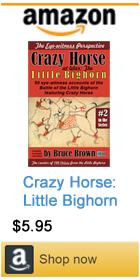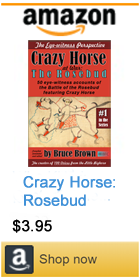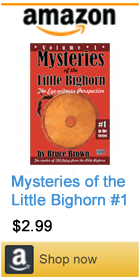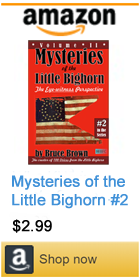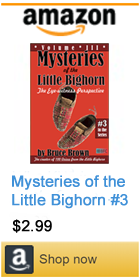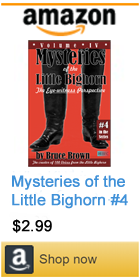|
||||||||||||
Bruce Brown's 100 Voices... Running Wolf's Story of the Battle
RUNNING WOLF enlisted in the spring of 1876 at Fort Lincoln with six others, Young Hawk, Horns-in-Front, Tall Bear, Foolish Bear, Red Foolish Bear, and Charging Bull. They started from Fort Berthold and camped over night at Fort Stevenson. Big John, an Arikara scout, was in charge of the party. The same man (already referred to) was in charge at Fort Stevenson. They camped next day just north of where Washburn is now and reached Bismarck by noon and went across the river in a steamboat. Next morning Gerard took them to headquarters where they were enlisted. The camp of the scouts was at the foot of the hill, but the next day they joined the soldiers in camp farther back from the river. While in camp they learned that Custer was at Washington and they were told that on his return he would start on the expedition.'" After Custer returned, six days went by before the expedition started. On the last day, Bobtailed Bull and Soldier were called to headquarters and the former was made sergeant. Then Gerard notified them next day to get ready for the parade, for they were to march Indian style, singing their own songs. This was to be the beginning of the first day of the march, and the songs they sang at that time were some of the same ones that were given when this story was told at the council at Bear's Belly. After the parade, the scouts led the march with Custer ahead, and the white cavalry bringing up the rear. The scout chief was Varnum (Peaked Face), he camped all the way near the scouts and had one orderly and a cook, who served his meals in his own tent. The army camped at noon and remained there till next morning. When they stopped for dinner the next day it started to rain and they went no farther that day. The next morning they went on and made a second camp west and north of the Heart River on a big flat. The next day there was no stop for dinner and the scouts called Camp No. 3, Turkey Buzzard Camp. From this camp at sunset the mail was sent back by two scouts, One Horn and Red Foolish Bear. The soldiers were paid off at the first camp. A herd of cattle was driven along with the army. The army ate dinner at Big Mountain (Butte) and made Camp No. 4 in a wide valley. They ate dinner the next day on the open prairie and Camp No. 5 was made at what is now Hebron. At the dinner stop next day it rained and the army camped there close to Young Man's Butte, Camp No. 6. Dinner was eaten the next day on a muddy flat and because the roads were too heavy for the loads, the army camped here, Camp No. 7, beyond Young Man's Butte. The army took dinner next day at a coulee east of the present station of Dickinson. At Camp No. 8, in the middle of the night, Red Foolish Bear came in and reported to Bob-tailed Bull that he had left Red Bear back on the trail with a played-out horse. Bob-tailed Bull took a party back on the trail for Red Bear and brought him to camp early in the morning. Strikes Two gave Red Bear his spare horse. The dinner stop that day was in a coulee with trees, and, because it was muddy, the army camped here, Camp No. 9. The army reached the Bad Lands by noon the next day and camped here, Camp No. 10. Custer went ahead to look for a trail for the wagons. [Note: this agrees with Peter Thompson's observation that Custer repeatedly exposed himself to danger on the trek to the Little Bighorn -- a pattern he repeated on the day of the battle. See Who Killed Custer -- The Eye-Witness Answer for more info.] The next day the army went into the Bad Lands and Camp No. 11 was just inside. Timber was cut and carried along for bridges. The orders next morning were that each man was to carry his own dinner. Camp No. 12 was made at the Little Missouri Valley, near Soldier Butte. The next day they passed the Butte and camped just beyond, Camp No. 13. It snowed here in the night, the snow was from two to three feet on the level. The army stayed here all day and the next night, and by the following day the snow had melted a good deal. So they went on through the mud and slush, which was heavy for the teams, along a flat-topped ridge. At the end of the ridge about noon they met Crow Bear, a Grosventre scout on horseback. He had come from Powder River with the mail and after dinner he turned back again. There was no stop for dinner that day. The army marched down a coulee to Beaver Creek and made Camp No. 14. The next day they followed up Beaver Creek to the end and made Camp No. 15. The next day the march was made on the open prairie, a flat land, and in the distance they could see blue hills. Camp No. 16 was made on the open prairie. They marched on next day toward the blue hills. toward a coulee with cottonwoods, Camp No. 17. The Dakota scouts said that their name for the place was Cottonwood Creek. They reached the foot hills by dinner time and after dinner they went on until they reached the point where the Powder River enters the Bad Lands. Here they made Camp No. 18. In the morning Custer came to Varnum's tent and called for Bob-tailed Bull. He told Bobtailed Bull that he wanted seven scouts to be sent ahead to look for signs of the Dakota, four Dakota scouts and three Arikara. The Arikara scouts sent out were Young Hawk, Forked Horn, One Feather. The Dakota scouts were Ca-roo, Ma-tok'-sha, Buffalo Body (Pta-a-ate), and White Cloud. Some white soldiers went along, too, and they marched in two lines. The orders were not to return until they had found fresh signs of the Dakotas. They were to report at the base camp at the mouth of the Powder River. Camp No. 19 was made at the mouth of the Powder River and there was a steamboat here. Two sick scouts, Horns-in-Front and Cha-ra-ta (Wolf), were left here at this camp, in care of Tall Bear. There was a store tent here in charge of a white man and he sold the hindquarters of a deer to the soldiers at $4 each. The wagons were left here with a guard of soldiers. The army marched on to Tongue River and camped up from the mouth about two and one-half miles, Camp No. 20.188 At this point the scouts sent back a report to Custer as to what they had found. They crossed the Tongue River and went on to a plateau, Camp No. 21. The next day they camped on a flat-topped elevation, quite a distance from the Rosebud and one mile from the Elk River, Camp No. 22. Camp No. 23 was on the high ground about a quarter of a mile above the mouth of the Rosebud River. Camp No. 24 was on the flat at the mouth of the Rosebud. 34 The next morning Custer and his brother Tom came to the scout camp to see Soldier, Bob-tailed Bull, and Bloody Knife; Gerard was interpreter. While they were there at the camp, Young Hawk told them that on this river they had found a fresh trail and camp of the Dakotas. At this time the steamboat was there landing boxes of hardtack crackers and they were opening the boxes. Just then the bugle blew and they all saddled up and rode to where the crackers were and each one took rations enough to fill his leather saddle bags. Custer was then writing dispatches and six scouts were detailed to take them to the base camp at the mouth of the Powder River. The scouts were: Foolish-Angry Bear (in charge), Running Wolf, Howling Wolf, Curly Head, Goose, and Young Hawk. But afterward, when Custer found out what scouts were in the party, he detained Young Hawk and Goose, because they had found traces of the Dakotas and he knew that Young Hawk could shoot well and would kill some of the enemies. He remembered Young Hawk from his Black Hills expedition and also Goose. The dispatches were ready and the four scouts who carried them received Custer's orders to stay at the base camp after delivering the dispatches. This was 3 or 4 o'clock in the afternoon. The scouts detailed for this duty were not anxious to return to the base camp, they preferred going on with the rest. They traveled all night, ate breakfast, traveled all day and all the next night until, at sunrise, they saw the wagons at the base camp one and a half miles away. Two Arikara scouts rode out of the camp to meet them, Charging-up-the-Hill and Wagon, these two had been left behind at Fort Lincoln. They all talked together for some time and then they went down to the base camp. It was then about noon and the six scouts were at once detailed to carry some Fort Lincoln dispatches on to Custer, and along with them went a white soldier. Running Wolf led this party of scouts and there were also Howling Wolf, Horns-in-Front, Tall Bear, Charging-up-the-Hill, and Curly Head. After dinner they started back and rode until the middle of the night, when they were too tired to go further and camped in order to sleep. In the morning they traveled on and reached a place to camp at dark near the Rosebud. The next morning they came up to the mouth of the Rosebud where the crackers were landed, and in the distance they saw men there. They thought it was the Dakotas and turned sharp into the timber on the Rosebud. They stayed here all day until sunset and then Tall Bear said, "Let's go back to the base camp." But the soldier, by signs and the use of a few Dakota words, told them they could not go back, that they must carry the dispatches on to Custer. He proposed to them that they cross the Rosebud after dark and swing around the Indians, whom they supposed were the Dakotas, and so go on to Custer. They followed his directions, they forded the Rosebud, the water was up to their arm-pits. They traveled all night, and the next day about 4 o'clock they saw the camp of soldiers at the mouth of the Big Horn. They thought this was Custer's trail they were following because it was too dark to see where he had gone and then, too, they feared the Dakotas, whom they supposed were seen at the mouth of the Rosebud. Those whom they had seen there were really the party of Strikes Two, retreating to the base camp from the fight on the Little Big Horn. This party of scouts had ridden ahead of those detailed to carry off the horses, they had passed them in the night in their hurry to keep out of the way of the Dakotas. At the Big Horn camp the scouts learned all the news of the Custer fight. Terry was in command here, he was called by the Arikara, Man-Wearing-the-Bear-Robe [Note: AKA Bear Coat]. Terry once wore a coat made of bearskin and the older scouts remembered him for this. Running Wolf does not know who told the news of the fight but all the scouts learned of it. The steamboat had gone up the Big Horn a little way, as far as the depth of the water would allow. It was understood that this boat had gone up for the wounded and survivors of the Custer fight. It was about noon when they learned this news. Then two scouts came in from the base camp, Crow Bear and a white soldier, bringing news of the arrival of Strikes Two and his party, with their news of defeat and loss. It was reported: "All of the white soldiers and some of the scouts were killed." Then Crow Bear said: "The scouts killed are Bloody Knife, Bob-tailed Bull, Little Brave, Forked Horn, Red-Foolish Bear, Young Hawk, and Goose," for these scouts were not in the two parties escaping to the base camp. Crow Bear and the white soldier were sent back immediately to the base camp with dispatches. Then Terry came to the scout camp and gave Running Wolf a pair of field glasses and told him to go up the Big Horn to the hills and look out for the returning steamboat. Running Wolf took Charging-up-the-Hill and rode off on this duty. At night they came back and reported they could see no boat. The next morning Terry again came to the camp and gave Running Wolf the same directions, handing him his own field glasses. Terry told Howling Wolf to go along also, to see if the steamboat was coming. They returned for dinner and Running Wolf handed back the glasses to Terry. Then about 3 or 4 P. M. he heard a sharp whistle upstream and knew that the steamboat was coming to them. They went down to the bank, scouts and all, and they saw a white canvas cover over the whole deck and wounded soldiers lying under it in the shade. On the prow of the boat they saw Strikes-the-Enemy, the Crow scout who was wounded. The soldiers began taking off the wounded and putting them down on the canvas lying on the bank. When this was about half done Running Wolf noticed Goose near the engine room with a blanket over his shoulders and his hand wounded and wrapped up in his chest. Then he went to him with another scout and helped him up the bank. Goose said to him: "We have fought the fight with the Sioux, we were cut off in the timber with the Sioux on every side but we escaped alive. The other scouts are coming on after the boat on foot." Soon they saw the white survivors coming along, and the four scouts last of all, Young Hawk, Red-Foolish-Bear, Forked Horn, and a Crow scout, Half-Yellow-Face. As he came up Young Hawk began to tell the story of the fight. "Bloody Knife is dead," he said, "Bob-tailed Bull is dead and Little Brave is dead. We could not find the body of Little Brave but the bodies of the others we found with their heads pounded and smashed to pieces." Young Hawk was leading the spotted pinto that had belonged to Little Brave. Young Hawk then related his story of his fight in the timber and also what took place after he reached the camp in the ravine. The next morning they put the wounded soldiers back into the boat with the scout, Goose, and they went down the river in the boat. Terry and the Chief-with-a-Red-Nose were in command. They told all the scouts to follow down the east bank of the Yellowstone (Elk) and look for a Dakota crossing over to the western side. The scouts were gone ten days and in the party were Forked Horn, Horns-in-Front, Red Foolish Bear, Charging-up-the-Hill, Tall Bear, Young Hawk, Running Wolf, and Wagon. Two of the scouts stayed behind in Terry's camp, Curly Head and Howling Wolf. They hunted for the Dakota trail across the river for ten days. They returned to Terry's camp and Soldier was not there. The camp was changed to the mouth of the Rosebud and so was the base camp at Powder River, making one base camp. The two commanders said they must go up the Rosebud and search for Sitting Bull. Half way up the Rosebud they met Crook in charge of a body of foot and some mounted scouts, Arappahoe or Shoshone. Here all the scouts got together, Terry and the Chief-with-a-Red-Nose, with Varnum and Crook and their men. They followed the Dakota trail to the Tongue River where they camped. Next day they went on to the Powder River where there was big timber on the bank. Here they camped. The next morning the surviving soldiers of Custer's command, all the Arikara scouts, and Crook's Indian scouts marched under Terry and Varnum down to the mouth of Powder River and camped there. Crook's command and all the rest of the soldiers stayed here. At the mouth of the Powder River the Crow scouts and Crook's scouts went back to their reservations. The rest of the camp returned to Crook's camp on the Rosebud but Crook had already gone on the Dakota trail. The Chief-with-a-Red-Nose and some other officers came to the camp of the scouts with a letter in his hand. He selected a detail of seven scouts to carry the letter to Crook while the rest of the camp were to go back to the base camp. The seven scouts were Soldier, Black Fox, Charging-up-the-Hill, Boy Chief, Young Hawk, Running Wolf, and Ca-roo (Dakota). They carried the letter to Crook's camp and delivered it to him. They found out that he was on Sitting Bull's trail. Crook notified them they were to stay and scout for him, reporting every other day, so they followed these orders day by day under Crook's command. When they came to Beaver Creek, Running Wolf and Young Hawk were out hunting by themselves on a ridge and the rest of the scouts were together. When Running Wolf and Young Hawk got to Beaver Creek, they found the rest of the scouts there and also a party of Indians on foot. There were cavalry here also under a separate commander. Ca-roo had already been sent back to Powder River with the mail but he soon returned and reported that the orders from Beaver Creek were that he was not to go with the mail but in place there were to go Soldier, Boy Chief, Black Fox, and Charging-up-the-Hill. The sun was just setting and the three scouts camped, that was all there was left of the original scouting party. The rations they got were two crackers apiece and two spoonfuls each of coffee and sugar. Just as they were going to bed somewhere about midnight they heard the sound of horses coming up. They were the Dakotas coming on horseback and soon they began firing at the camp. The soldiers began to run out of tents, half asleep, sometimes without guns or anything to fight with. The orders were that they were to make for a ridge of higher ground. The Dakotas were circling and firing into the camp and the soldiers were firing back, making it quite light. The cavalry did not at first take part in the fight but presently the bugle sounded, they got lanterns and saddled up and began to take part in the fight, too, and the Dakotas retired into the darkness. The scouts were on a little hill and did not take much part in the fight. The next day the soldiers stopped following the Dakota trail and came to Soldier Butte, where they camped. They reached the Little Missouri and found an old Dakota camp there and camped for the night. About noon they found a Dakota camp in the timber but the officer would not let them fight the Dakotas, for he said he wanted them to stay by the camp and that he would camp on Custer's old camp site east of the Rosebud Butte. They reached this spot about 5 P. M. About dark the scouts noticed a confused gathering of men in the cavalry camp and it looked strange to them. Ca-roo went up to see what was going on among the soldiers and Young Hawk followed him and then, calling Runing Wolf by name, he said: "These men are writing letters to go back to Fort Lincoln and we are to carry them tonight." They had supper and at sunset they started out with the letters for Fort Lincoln. They rode all night and then stopped to eat and feed their horses at Young Man's Butte. They rode all day and reached Sentinel Butte when it was very dark. They traveled all that night and all the next day, reaching Fort Lincoln when it was nearly dark. Running Wolf was discharged in January, 1877. The Arikara Narrative of Custer's Campaign against the Hostile Dakotas, June 1876, edited by Orin Grant Libby, State Historical Society of North Dakota, Bismark, ND 1920 p 136 - 149
For more information on Custer's scouts, please see The Twisted Saga of the Unsung Seventh Cavalry Scouts.
|
||||||||||||



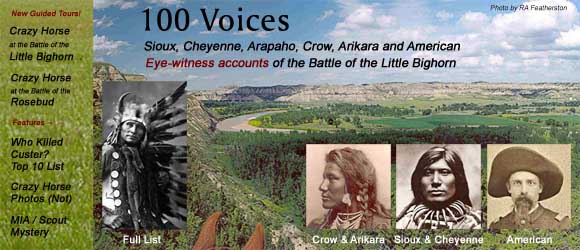
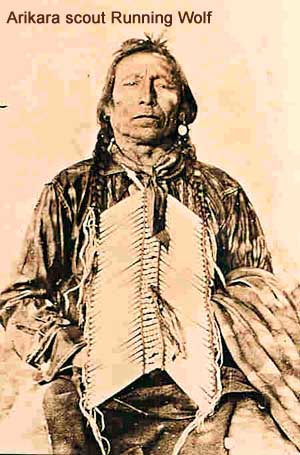 RUNNING WOLF'S ACCOUNT
RUNNING WOLF'S ACCOUNT
